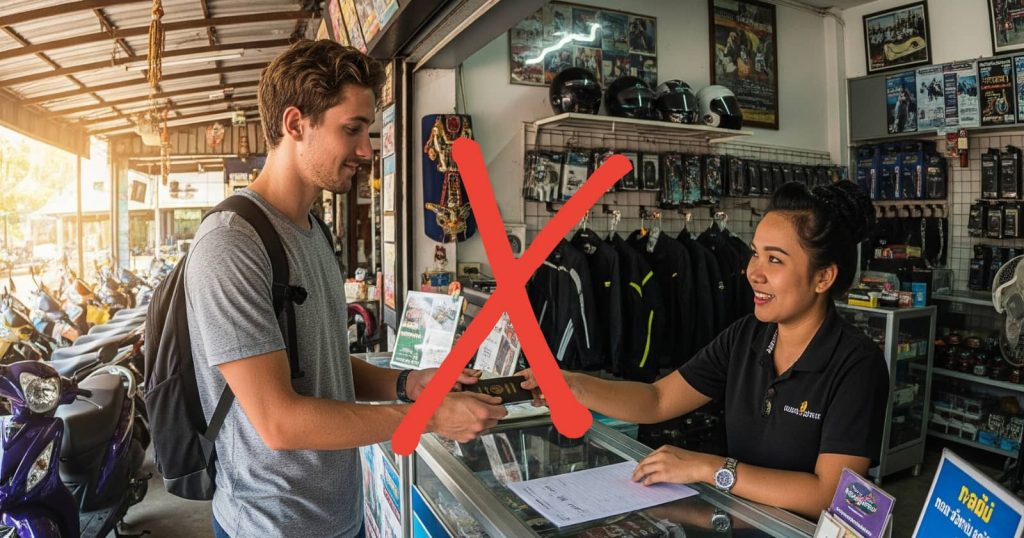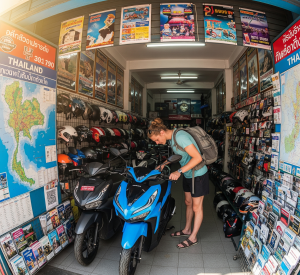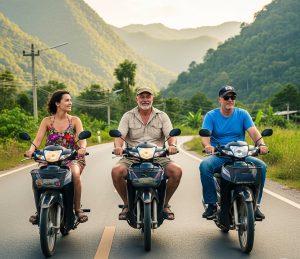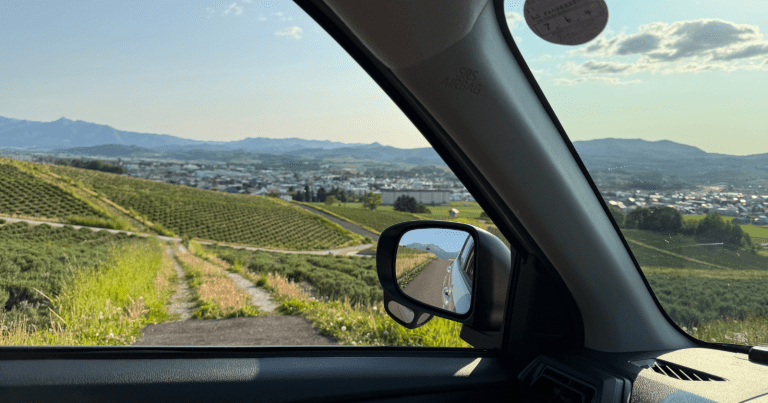
Ah, Thailand! The land of smiles, stunning beaches, vibrant markets, and the unmistakable hum of scooters zipping by. For many independent travelers, backpackers, and first-time visitors to Asia, the allure of renting a scooter is undeniable. It promises freedom, the wind in your hair, and the ability to discover hidden gems far from the beaten tourist path. But let’s be real: the dream can quickly turn into a nightmare if you’re not savvy.
I’ve seen my fair share of travel mishaps, and unfortunately, scooter rental scams in Thailand are a common pitfall. That’s why I’m here to equip you with the ultimate guide to Renting a Scooter Safely in Thailand. My goal is simple: empower you with insider knowledge, actionable tips, and battle-tested strategies to ensure your two-wheeled adventure is epic, not a costly lesson.
You see, while Thailand offers incredible experiences, it also presents situations where a lack of local knowledge can leave you vulnerable. Whether you’re navigating the bustling streets of Bangkok, exploring the serene islands, or cruising through the northern mountains, a scooter can truly enhance your trip. But before you hand over your cash and hop on, you need to understand the rules of the game. This isn’t just about knowing how to ride; it’s about knowing how to protect yourself from scams, unwarranted charges, and potentially dangerous situations. Consider this your must-read manual for a worry-free ride.
Core Strategies for a Scam-Free Scooter Rental
Let’s kick things off with the absolute golden rules for securing your ride. These aren’t just suggestions; they are the bedrock of safe travel in Thailand when it comes to two wheels. Ignore them at your peril!
1. The Ironclad Rule

This is, without a doubt, the single most crucial piece of advice I can give you. When renting a scooter in Thailand, many rental shops will ask for your passport as collateral. NEVER, under any circumstances, hand over your original passport. Why? Because it gives them immense leverage. If there’s an alleged scratch or damage upon return, they can hold your passport hostage until you pay an exorbitant fee. It puts you in an incredibly vulnerable position, especially if you have a flight to catch. The reasoning behind this rule is simple: without your passport, you’re stuck, and they know it.
So, what do you do instead? Offer alternatives. Most legitimate shops will accept a photocopy of your passport along with a cash deposit. This deposit can range from a few thousand Thai Baht (THB) up to 5,000-10,000 THB depending on the bike’s value. Make sure you get a clear receipt for this deposit. If a shop insists on your original passport and won’t budge on a cash deposit, walk away. There are plenty of other rental places, trust me. Your passport is your lifeline; protect it.
2. Pre-Rental Inspection
Before you even think about starting the engine, conduct a thorough inspection of the scooter. This isn’t just about aesthetics; it’s your primary defense against bogus damage claims. Take out your phone and become a meticulous forensic investigator. Take photos and videos of the entire motorbike from every angle. Zoom in on every existing scratch, ding, dent, or imperfection, no matter how minor. Document the tire condition, the mirrors, the lights, the handlebars, and even the exhaust pipe. Get close-ups of any wear and tear.
Beyond the cosmetic, test the bike’s functionality. Check both front and rear brakes; they should feel firm and responsive. Ensure the headlights, taillights, and turn signals are all working. Check the tire pressure – under-inflated tires are dangerous and can be a sign of poor maintenance. Ask about the fuel level; some places give you an empty tank, others partially full. Confirm this before you leave. This meticulous documentation acts as undeniable evidence should a dispute arise upon return. It explains the “why” behind the tip: you’re creating an irrefutable timeline of the scooter’s condition prior to your rental period, protecting your deposit.
I recall a harrowing experience in Phuket, where I almost fell victim to this exact scam. I was tired from a long journey and, against my better judgment, hurried the inspection. Upon return, the rental shop owner pointed to a tiny scratch near the footrest, claiming it was new. Thankfully, I had taken a few hasty photos, which, while not exhaustive, showed the area. He tried to argue, but my refusal to pay, combined with the visible evidence and my firm stance, eventually led him to back down. It was a close call and a harsh lesson: never compromise on your pre-rental inspection, especially in places like bustling tourist hubs.
3. Choosing Your Rental Spot Wisely
Where you rent your scooter matters immensely. While your hotel or guesthouse might offer the convenience of on-site rentals, they typically charge significantly higher prices. They often act as middlemen, taking a commission, which means you’re paying a premium for the same bike you could get elsewhere. To save money and often get a better deal, seek out independent local rental shops.
How do you find them? Google Maps is your friend here. Search for “scooter rental near me” or “motorbike rental [your location]”. Look for shops with a good number of positive reviews, specifically mentioning fair dealing and good bike condition. Reviews often reveal if a shop is notorious for scams. Don’t be afraid to walk around your immediate area; you’ll likely spot several small, family-run operations. These local shops are more inclined to negotiate prices, especially if you’re renting for multiple days. Speaking of which…
4. Negotiate the Price
Unlike fixed-price retail, scooter rental prices in Thailand are often negotiable, particularly if you’re renting for more than a day or two. Don’t just accept the first price quoted. Politely ask if there’s a better rate for a few days. You might be surprised at how much you can save simply by asking. Most shops have a daily rate, a 3-day rate, and a weekly rate, with the longer rentals typically offering a lower per-day cost. Be friendly but firm. Remember, you’re a valuable customer, and they want your business.
Advanced Tips for a Smoother Ride
Beyond the initial rental, navigating the realities of riding a scooter in Thailand requires additional foresight. These tips will help you manage potential issues and ensure you’re riding both safely and legally.
5. Understand Your Insurance (Or Lack Thereof)
This is a big one. Most basic scooter rental agreements in Thailand DO NOT include comprehensive insurance. If you have an accident, even a minor one, you’ll likely be responsible for the full cost of damages to the bike. Your personal travel insurance *might* cover some medical expenses for injuries, but often explicitly excludes accidents involving motorbikes if you don’t hold the correct license in your home country or if you weren’t wearing a helmet. It’s a critical loophole many travelers overlook.
Before you even leave your home country, check your travel insurance policy thoroughly regarding motorbike rentals. Many policies have clauses that state they won’t cover incidents if you’re not legally licensed to ride a motorbike in your home country, or if you’re not wearing a helmet. Seriously, read the fine print! If in doubt, call your insurance provider. For additional peace of mind, consider an upgrade to a policy that explicitly covers scooter rentals, or inquire if the rental shop offers third-party insurance (though this is rare and often minimal). Ignorance here can lead to astronomical medical bills or repair costs.
6. Driving Legally & Safely

To legally ride a scooter in Thailand, you need an International Driving Permit (IDP) along with your valid motorbike license from your home country. An IDP is essentially a translation of your license. While many tourists ride without one and get away with it, police checkpoints are common, especially in tourist areas. If you’re pulled over without an IDP and a valid motorbike endorsement on your home license, you’ll face a fine (typically 500-1000 THB). More importantly, if you’re involved in an accident, riding illegally could void your travel insurance and leave you fully liable for all damages and medical costs.
Always wear a helmet. Not only is it legally required, but it’s an absolute non-negotiable for your safety. Thai roads can be chaotic, and accidents happen. According to the World Health Organization, wearing a quality motorcycle helmet can reduce the risk of death by 40% and the risk of severe head injury by 70%. Don’t rely on the flimsy helmets often provided by rental shops; if possible, invest in a sturdier one or rent from a place offering better quality. Stick to the left side of the road, be aware of unpredictable traffic, and never, ever drink and drive. Road safety in Thailand is a serious concern, with high accident rates, as highlighted by recent reports on road conditions.
7. Handling Accidents or Damage
Despite all precautions, accidents can happen. If you’re involved in a minor fender bender or discover damage to the bike (even if it’s not your fault), remain calm. Do NOT drive away from the scene. Your first step should be to contact the rental shop immediately. If there’s another vehicle involved or any injury, however minor, call the tourist police (dial 1155). They can mediate and help ensure fair treatment. Take photos of the accident scene, any damage, and involved parties. Do not agree to pay anything on the spot without clear assessment or police presence. Remember, documenting everything is key to your security abroad.
8. Copies of Documents & Communication Hacks
Always carry a physical photocopy of your passport (not the original) and your International Driving Permit when riding. Keep the originals secure at your accommodation. This way, if you’re stopped by police, you can present the copies, and if something happens to the bike or your bag, your crucial documents are safe. For communication with rental shop owners or in emergency situations, Google Translate is an invaluable tool. It can bridge language barriers, helping you understand rental terms or explain an issue more clearly.
Niche Tips & Resource Pointers
Even with all the preparation, the travel landscape is ever-evolving. Here are some final pointers to keep you ahead of the curve.
Tap into the Savvy Traveler Network

Before you travel, or even once you’re on the ground, consult online traveler forums and Facebook groups dedicated to travel in Thailand. These communities are goldmines for real-time information. You’ll find recent discussions about reputable (and disreputable) rental shops, current scam alerts, and even tips on specific routes or road conditions. Search for groups like “Thailand Backpacking” or “Expats in [your specific city/island]”. People are often very willing to share their firsthand experiences and warnings.
Consider Alternatives to Self-Rental
While the freedom of a scooter is great, it’s not for everyone, especially if you’re new to riding or prefer not to navigate unfamiliar roads. For exploring islands or specific attractions, consider using local songthaews (shared taxis), tuk-tuks, or even taxi apps like Grab or Bolt. For longer excursions, many reputable tour operators offer organized trips that include transport to popular spots like Thailand’s stunning beaches and islands. This completely removes the stress of self-driving and dealing with rentals. If your trip is about soaking in the local flavors, perhaps exploring Thailand’s vibrant street food scene on foot or by public transport is a better, safer bet.
When to Say “No” to a Scooter
There are times when renting a scooter, despite your desire, is simply not a good idea. If you have no prior experience riding a motorbike, Thailand’s roads are not the place to learn. The traffic can be incredibly dense and unpredictable, especially in cities like Bangkok or Chiang Mai. If you’re feeling unwell, sleep-deprived, or under the influence of alcohol, absolutely do not ride. Your safety, and the safety of others, comes first. Remember, safety first is safety always. – Charles M. Hayes. Additionally, if the weather turns bad (heavy rain can make roads extremely slippery), consider postponing your ride.
Your Confident Ride Awaits
Renting a scooter in Thailand offers an unparalleled sense of adventure and freedom, allowing you to discover so much more than if you relied solely on public transport or taxis. But like any truly rewarding travel experience, it requires a little preparation and a lot of street smarts. By internalizing these key strategies – never giving up your passport, meticulously inspecting your rental with your camera, choosing reputable local shops, and understanding the nuances of insurance and local laws – you’re not just renting a scooter; you’re taking control of your travel experience.
So, go forth! Embrace the open road, discover hidden waterfalls, and cruise along breathtaking coastlines. With these tips in your back pocket, you’ll confidently navigate the rental process, sidestep common scams, and ultimately enhance your Thai adventure. You’re now equipped with the insider knowledge to make better decisions on the road, travel more efficiently, and enjoy every moment, knowing you’ve outsmarted the potential pitfalls.







